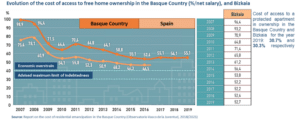What does youth emancipation look like in the Basque Country?
On June 26, 2015, the Basque Parliament approved the Basque Housing Law, which included a new legislation in Basque Country: the legal right to access a decent and adequate home. This new legislation recognizes the right of citizens to demand, access to a home from the Public Administrations. This was a huge transformation from the existing policy and has significant potential social impacts, especially for the most vulnerable populations, including young people.
Access to their own home is perhaps the most important milestone in achieving independence for any young person. However, the high price of apartments, either renting or buying, and low salaries among this group makes housing independence very difficult.
In Euskadi ―the name for Basque Country in our native language of Euskera – youth independence from their families happens later in life. As a result there is a very low number of people under 35 who are self sufficient and independent from their parents.
The difficulties that young people face in accessing their own places to live produces situations of exclusion among young people and issues for society as a whole. Not only does it directly affect young people’s ability to realize their own aspirations, but also because it delays the generational change of society itself, since this causes young people to postpone starting a family. Therefore it is not surprising that birth rates continue to decline and the median age of the population continues to climb. In the Basque Country, the population under 35 years represents just the 32.5% of the population.

The Basque Government and local municipalities have jointly promoted several policies trying to mitigate this situation among young people including programs promoting the availability of protected housing or subsidized monthly rent, as well as aid for rebuilding housing stock, among others. Despite all these efforts, our young people still face a tough reality.
Perhaps the most revealing figure is the fact that 64% of the young people under 35 years are not yet living on their own. Furthermore, 91.9% of those between 18 and 24 years still live with their parents; this number decreases to 66.9% for young people between 25 and 29 years, and to 29.9% among those between 30 and 34 years.
From this, only 33.3% of individuals still living with their parents admit needing their own places to live; while 41.8% of them realise they may not be able to become independent within the next four years. Regarding the distribution by gender, the percentage of women 18-34 who live independently of their parents is significantly higher than that of men. The numbers reflect a difference of almost ten percentage points: 40.1% and 32.0% in the case of women and men, respectively.
Likewise, young people with foreign nationalities in the territory also present figures much higher than those registered among natives: 73.8% and 28.6% respectively. Furthermore young foreigners who live away from their parents tend to rent homes (compared to buying) in a proportion of 77.9% compared to 31.0% of locals. This difference can likely be explained by these young people’s desire for residential mobility, in addition to generally facing greater barriers to home ownership.
Recent conversations with specialists in the territory seem to confirm that the situation of young people moving out of their parent’s homes in the Basque Country has changed very little in recent years, which is supported by the statistics revealed in the report Youth, Emancipation and the Need for Housing in Euskadi (Basque Youth Observatory, 2019).
According to this document, in 2015, the total percentage of people aged 18 to 34 who live independently was 37.0%, then 35.6% in 2017 and 36% in 2019. Again, despite all political efforts, the current numbers place us below the EU average, of 51.8%. Similarly, the average age to move out stays consistent around 30 from 2015-2019 in the Basque country, which is almost five percentage points higher than the EU average pf 25.9. As the saying goes, “There is no place like home,” in Basque County.
It is important to note that the average age to move away from home is 6 years above what young people themselves declare to the ideal age to move out, which is 23.9. This number coming from youth themselves deserves special consideration in policy circles.
Young people are also going into more than the recommended amount of debt in order to live independently. Of the total number of young people who don’t live with their parents and who own a home, 21.1% are above the recommended maximum debt limit. In the case of these young people with rental housing, 40% pay more than the recommended amount; while, among young foreigners, this percentage doubles compared to nationals.
These conditions put some youth at risk of social exclusion, so regional and local governments try to cushion their effects through providing regular economic supports. 8.7% of the youth who live independently in the territory state that they live in a home where someone receives some type of social or economic public support (e.g. minimum guaranteed income, social emergency aid, etc.); meanwhile, 20.4% of young households in an overstrained situation claim to receive some public support of social nature.
Although these numbers have been falling in recent years (12.1% in 2015, then and 11.0% in 2017), it is expected that due to the current crisis caused by the Covid-19, they will noticeably escalate.
As a product of the policies and programs promoted by the Basque Government and the local municipalities, 13.6% of the youth living away from their parents in the region reside in protected housing, whether that be an officially protected property (9.3%) or a rental one (4.2%).
The stock of protected homes throughout the area has decreased by -4.6% from 2015-2019. Protected rental housing on the other hand has been growing (5.7% growth from 2015 to 2019) showing a new strategic direction from the Basque Government.
On the other hand, 83.0% youth living independently of their parents today live in existing homes, where the average age of home is 42 years, while 38.4% of youth reside in dwellings more than 50 years old.
Including Youth Perspectives in Policy
In the report Youth, Emancipation and the Need for Housing in Euskadi (Basque Youth Observatory, 2019), we see the opinion of young Basques, who think that policy and programs should focus more on affordable rent of existing dwellings, increasing the stock of protected housing, providing a greater support for the purchase of homes, reducing the value of the land, mitigating the number of empty flats, encouraging rehabilitation of old uninhabited houses, and reducing the costs associated with home financing, among others.
The opportunity to move away from home and get a place of your own for the first time, either to rent or to own, is a very important milestone every young person’s life. When this opportunity is delayed it can be frustrating and discouraging. The persistence of this issue in Basque Country and in the rest of Europe makes it a concern and in order to address it we must understand the depth and context of the issue.
It is necessary to examine how policies and programs that attempt to reduce housing inequality are generated; how the different governments in an area cooperate with each other to implement policy as efficiently as possible, what action emerges from these policies; what the beneficiaries of these policies and programs have to say; what areas of improvement there are; how space for reflection is created among the different stakeholders engaging in policy creation in the region; and how innovation arises and is generated in the design and implementation of the policy process. All of this must be done in order to create a better response to the need for accessible housing, and therefore an increase in the levels of well-being in society.
To this end, the European project H2020 UPLIFT (Urban Policy Innovation to address inequality with and for Future generaTions) was born in 2020, encouraging placing young people’s voices at the center of youth policy and discussing the various socio-political dimensions that influence the opportunities and capacities of young people to access affordable and decent housing; while trying to provide inputs, good practices and experiences ―through a reflective agenda- that could be useful to those responsible for the elaboration and promotion of related policies.
UPLIFT will be a three-year collective knowledge program that will involve 16 European cities, one of which is Barakaldo, the second most populated and diverse urban center in the historic territory of Bizkaia, the Basque Country. In this region, the methodological and research support will be undertaken by Orkestra – the Basque Institute of Competitiveness (Deusto Foundation).
At Orkestra, we believe in an increasingly inclusive and sustainable territorial competitiveness, which places people more than ever at the core of its work, and which, by stimulating the drivers and competitive components of the Basque Country, contributes to improving the present and future welfare of its citizens. That is why Orkestra is excited to be a part of this project.

